Cost of Living (Supermarket Prices) 2016
Below are supermarket prices from Supermaxi and Megamaxi in Quito for 2016. Almost all products are locally produced or made and the few that aren’t are mainly made in Colombia. This list should help give anyone interested in cost of living with regard to food and household items an idea of prices for 2016.
Members are welcome to contribute/compare their prices from other shops/markets, cities/towns.
Vegetables
Tomato $1.27 kg
Red Onion $2.77 kg
White Inion $2.95 kg
Lettuce - $0.85 for one
Kale $1.79, 150 grams
Fresh Oregano/Basil/Rosemary $0.65, 50 grams
Asparagus $1.33 250 grams
Green Peppers $1.00 kg
Lemon $0.75 kg
Limes $1.50-$2.25 kg
White Mushrooms $2.20, 220 grams
Spinach $0.93 150 grams
Eggplant $1.15 kg
Potato $0.90-$1.20 kg
Zucchini $0.95 kg
Carrots $1.12 kg
Green Plantains $0.51 kg
Cucumber $0.75 kg
Broccoli $0.80 kg
Beets $1.20 kg
Napa Cabbage $0.67 kg
Celery (clean) $0.85 350 grams
Leek $1.31 kg
Fresh Ginger $2.40 kg
Fruits
Grapefruit $0.99 kg
Mandarins $3.50 kg
Bananas $0.85 kg
Red Grapes $4.20 kg
Strawberries $3.20 kg
Oranges $3.60 kg
Apples (Chile) $1.20 kg
Dragon Fruit $4.00 kg
Strawberries $1.45-$3.50, 500grams
Raspberries $3.60, 180 grams
Avocados $2-$3 kg
Custard Apple $6.00 kg
Watermelon $0.93 kg
Pomegranate $5.00 kg
Meats, Poultry, Seafood
Ground Beed (1% Fat) - $9.35 kg
Ground Beef (6-7% fat) $6.14 kg
Burgers 4 patties(non-frozen) $3.00
Beef Cube (stew) $6.87
T-Bone Steak - $11.85
Pork Chops $9.50-$10.50 kg
Lamb Leg $15 kg
Whole Chicken $2.75 kg
Chicken Breast $6.50-$8.50
Drumsticks $4.50-$6.00
Chicken Wings $4.25-$6.25
Tilapia Fillet $12.75 kg
Corvina (Sea Bass) Fillet $19
Salmon Fillet $23 kg
Shrimp (large) $12 kg
Canned and Package
Tuna 6 Cans (Real brand) $7.80
Rice $2.95, 2 kg, 5kg $7.26
Canned Tomato 400gm - $1.40
Lasagna 400 grams - $3.25
Pasta Spagetti/Fettucine - $1-$1.85 (400-500 grams)
Oatmeal $0.95, 500 grams
Sunflower Oil (Girasol)2 liters - $6
Olive oil (extra) $10 liter
Eggs (ex.lg) $2.25 for 15
Red Kidney Beans $1.25 can
Chick Peas can $1.25 can
Black beans $1.25 can
Instant Coffee (Buendia) $3.00 50 grams
Pancake Flour $2.50, 900 grams
Maple Syrup $3.00 , 24 oz
Peanut Butter (Peter Pan) $5.50 , 400 grams (rarely available -runs out quick)
Peanut Butter (Local, organic), $9.80 , 650 grams
Strawberry Jam $2.75 , 500 grams
Granola Cereal, $3.50, 14 oz
Coco Crisp/Frosted Flakes/Etc $5.90-$6.50 , 800 grams
Paprika $9.00 lb
Ranch Dressing $2.40 300 ml
Ketchup (Andes) $3.00 800 grams
Mustard (Andes) $1.65 370 grams
Mayonnaise (Andes) $8.00 , 4kg (tub)
Diary
Yogurt 1 liter - $2.30-$3.75
Yogurt Drink (plain) $2.75 900 ml
Mozzarella Cheese 500grams $ 4.75
Cheddar Cheese 400 grams $5.67
American Cheese 300 grams $4.00
Cream Cheese 160 grams $2.35
Camembert Cheese 200 grams $3.63
Ricotta Cheese $1.65-$2.50 250 grams
Parmesan Cheese $1.75 100 grams
Brie Cheese $5.50 200 grams
Milk Gallon (whole) -$5.06
Milk (skim) $1.25 , liter
Butter $2.50 , 250 grams
Soya milk $2.00 liter
Coconut Milk $3.50-$4.00 400 ml can
Cleaning Supplies & Hygiene
Deodorant Speedstick $3.00
Listerine $6-$8 , 500 ml
Shavers Bic $3.00 for 7 double blade
Gillete Mach 3 $10.00 for 3
Palmolive Bar Soap $2.5 for 3
Dove Soap Bar Soap $3.50 for 3
Toothpaste $1.50-$3.50 medium tube
Tresemme Shampoo $11 for 28 oz
Tresemme Conditioner $12 for 28 oz
Loreal Shampoo $4.60 small
Dish Soap $1.85 900 ml
Mr. Muscle Bathroom cleaner spray $4.75
Mr. Muscle Kitchen cleaner spray $4.75
Wood Floor cleaner spray $3.50
Cleaning Detergent (Ariel) $6.00, 2 kg
Fabric Softener $2.75, 2 liters
Snacks
Nutella $11.00, 750 grams
Chocolate Fudge Cake $8.00, 750 grams
Chips Ahoy $2.45, 270 gms
Ritz Crackers $1.60, 368 gms
Hagen-Daez Ice Cream $6.50 pint
Pinguino Oreo Ice Cream $3.50 , 900ml
Mozzarella Sticks 5 pc $2.25 150 gms
Doritos 12 pk $5.00
Ruffles 12 pk $4.25
Tostitos $1.25, 150 grams
Tostitos $0.45 50 grams
Snickers Bar/Skittles $1.04
Kit Kat $1.14
Hershey Bar $2.25
Crunch $1.65 100 gms
Twix $1.75
Orange Juice (natural) $5.50 2 liters
Sprite/Coke $0.91 for 1.35 liters
Breads
French Bread $1.25
English Muffins $2.80 for 6
White Bread loaf- $1.50+
Whole Wheat Integral $2.09 , 350 grams
Wheat Roll $0.30 each
Croissants $0.55 each
Pizza Dough 2 medium pies $3
Tacos (9 pcs) $1.80
Misc
Whiskas Cat Food $11, 1.5 kg
Cat Liter $8.69, 4 kg
Pilsener 6pk $5.50
Budweiser 6pk $6.00
Corona 6pk $13.50
Heineken 6pk $12.50
- Accommodation in Quito - Guide
- Food Catering Services in Ecuador - Business
- Cost of Living - 9 Replies
- What's your experience with Negotiating Prices in Ecuador? - 2 Replies
- Property prices in Ecuador - 16 Replies
- Mercado Prices - 8 Replies
- Cost of Living in Ecuador - 12 Replies
Terrific information, and exhaustive. Thank you. A lot of folks use numbeo for cost of living stats and comparisons. That site uses specific common items to create a data base. It would be awesome to transfer some of the info from here to there. http://www.numbeo.com/cost-of-living/ci … city=Quito
Great information!
Just one small observation.
The prices reflect the "packaging" involved for the presentation of the produce to be sold in the Supermarkets.
In many towns, we don't have the supermarket option, take for instance, Same, Sua, Atacames and Tonsupa areas in Esmeraldas.
We buy the products / produce in the "open markets" where prices are more affordable; in comparison, perhaps half the price mentioned.
Just to give you an idea, shrimp can be bought directly from the fishermen at $3,00 - $4,00 / Kg. . Fish (corvina) at $1,50 Kg.
Fresh tropical fruits, papayas, pineapples, soursops, mangoes, oranges, dragon fruit, bananas, at ridiculous prices.
In short; similarly to the climate you can choose to live in , you can also choose where to buy your groceries, thus the price you are willing, or can afford to pay within your budget.
MM
Yeah, get rid of the environmentally unfriendly packaging. In Germany, and some other European countries, consumers helped get rid of superfluous packaging by insisting on spending time at the cash register counters removing the packaging before allowing the codes to be scanned, or in some cases, requiring the cashiers to remove the packaging. I don't recall the country, though Denmark is likely, where the government required that the sellers take responsibility for removing the packaging. Either way this resulted in a lot of wasted but paid hours of work as well as the store having to deal with the bulk of the packaging. The end result, of course, was a LOT less packaging.
I love doing that, especially around Christmas time when sellers are in a rush to get consumers in and out.
I know of cases where a product has arrived with 6, count them 6, layers of packaging. More cost to ship, more loss of resources (oil and wood, i.e. plastic and paper), greater cost, less product.
marcomueses wrote:Great information!
Just one small observation.
The prices reflect the "packaging" involved for the presentation of the produce to be sold in the Supermarkets.
In many towns, we don't have the supermarket option, take for instance, Same, Sua, Atacames and Tonsupa areas in Esmeraldas.
We buy the products / produce in the "open markets" where prices are more affordable; in comparison, perhaps half the price mentioned.
Just to give you an idea, shrimp can be bought directly from the fishermen at $3,00 - $4,00 / Kg. . Fish (corvina) at $1,50 Kg.
Fresh tropical fruits, papayas, pineapples, soursops, mangoes, oranges, dragon fruit, bananas, at ridiculous prices.
In short; similarly to the climate you can choose to live in , you can also choose where to buy your groceries, thus the price you are willing, or can afford to pay within your budget.
MM
That’s a great price for corvina. The cheapest I’ve seen it here is $5.50 a pound or about $12 a kg at a mercado, but there’s risk with shopping for seafood at mercados in Quito. But in general food costs are not cheap in Quito and aside from packaging the higher costs are also attributed to rent, higher salaries and other expenses that supermarkets have. Comparing a capital city‘s prices to a small city/town is like comparing apples to oranges though.
------------------------------------------------------------------------------------------------------------------------------
If someone is disciplined they can save a little money here and there for example Supermaxi has 10-15% off on Fridays for meats and poultry and 20% off on fruits and vegetables on Wednesdays. Friday-Monday is however an unpleasant time to shop as Supermarkets are very crowded. Also when computing time, r/t taxi fare, it’s just not worth it to divide shopping days solely to get certain items.
The mercados are also cheaper for somethings but the fruit and veggie sellers are like mercenaries they have no concept of loyalty. I got fed up with them as you have to be constantly vigilant when shopping as sometimes they’ll sneak over ripened fruits/veggies in your bag. About the only things I buy from there are corvina steaks and lamb and both from sellers I developed a good relationship and they only care about me as customer is because I buy in bulk to minimize trips. The Borrego (lamb) lady I buy from has a walk in refrigerator box on the premises and she’ll take me back there to get specific cuts if I’m not satisfied with what she has on display.
There’s also Coral, but no thank you as their meat and seafood section is undesirable (N.Quito), and also Santa Maria that some locals claim in cheaper (my doorman for example) but that’s relative. And probably cheaper for products that some locals use a lot like rice, soya oil and beans.
lois2b wrote:Yeah, get rid of the environmentally unfriendly packaging. In Germany, and some other European countries, consumers helped get rid of superfluous packaging by insisting on spending time at the cash register counters removing the packaging before allowing the codes to be scanned, or in some cases, requiring the cashiers to remove the packaging. I don't recall the country, though Denmark is likely, where the government required that the sellers take responsibility for removing the packaging. Either way this resulted in a lot of wasted but paid hours of work as well as the store having to deal with the bulk of the packaging. The end result, of course, was a LOT less packaging.
I love doing that, especially around Christmas time when sellers are in a rush to get consumers in and out.
I know of cases where a product has arrived with 6, count them 6, layers of packaging. More cost to ship, more loss of resources (oil and wood, i.e. plastic and paper), greater cost, less product.
Sounds great but we’re not quite there yet in terms of getting rid of packaging that is detrimental to the environment. Supermaxi and Megamaxi do however sell reusable bags so you don’t have to use plastic shopping bags all the time. They sell them three for a dollar, and honestly sometimes we take them and sometimes not as we often forget. A good start is banning plastic bags on certain days, and simply beginning with one day. I know some countries have initiated this and increased days gradually.
..." Comparing a capital city‘s prices to a small city/town is like comparing apples to oranges though".
Totally agree with Vsimple comment.
I'd like to add, produce from the "Sierra" become more expensive in the "Costa" and viceversa. Example: the cost for fish is more expensive in Quito and cost for corn on the cob and potatoes triples the price in Esmeraldas.
Also, the plus side of living in a small town gives you the opportunity to have some of the produce delivered right to your door. The market comes to your house in the form of a pick up truck or a moto-taxi. I buy from them eggs, fruits and vegetables. Once you become their preferred customer they'll go out of their way to get you the best service and best produce, of course they'll charge you a bit more than regular prices than the open market, that's how they make their living. .... No plastic bags nor extra packaging required, use your own basket /container from home.
Supermarkets, especially in Ecuador, are for people who don't care about prices, except for items they find necessary and cannot find elsewhere. Prices at local open markets are generally orders of magnitude less. I will try to include photos of prices here but, in case I fail, full meals at public markets run US$2-3. You can buy fresh fish not much more than $2/pound. Large bottles of beer you can buy from vendors at around 90 cents while produce costs very little. I have seen small avocados at 5/$1, large at 3/$1. Big juice oranges seem pricey to me at 6/$1. Using supermarket prices as a food cost indicator is like using tourist restaurant prices. Besides, I rather like supporting little guys rather than the greedy, super-rich and arch-conservative Grant people who own SuperMaxi. I used to be concerned about being treated fairly but now find market produce shopping a pleasant adventure with friendly, charming vendors and we both often laugh at my Spanish. I try to bring my own bags to avoid yet more plastic, which is a blight on the planet.
Then, of course there is gasoline at $1.45/US gallon and diesel at $1.04. I got a crown for $140, but that was 7 years ago. My very competent and thorough Ibarra neurologist recently set me back $45 for a same day appointment. When he said he would like to see a CT scan due to an earlier head injury he sent me to a nearby radiology center with a prescription. I paid $60, got the scan in new looking equipment and returned to his office half hour later with film in hand (hard copy), while it was also available in digital. He took another half hour or more explaining it to me (I had also recently gotten an EKG from him, which he explained and gave me about 20 printed pages of my brain activity).
smitty88 wrote:Supermarkets, especially in Ecuador, are for people who don't care about prices, except for items they find necessary and cannot find elsewhere.
Using supermarket prices as a food cost indicator is like using tourist restaurant prices.
You make it seem like shopping at a supermarket is luxurious or for wealthy people. Maybe in towns and small cities where supermarkets are viewed as such but that is not the case for Quito. Ecuadoreans from all walks of life shop at supermarkets in Quito. This is evident by the dozens of supermarkets in affluent, middle class, poor and even ghetto neighborhoods. Sur Quito is very poor and I am sure the people who live there think about prices.
Personally we shop at supermarkets because it's how you conveniently get groceries just like many other Quiteños . Additionally prices are not significantly different from mercados, and supermarkets are much cleaner.
Probably you guys already know about this useful tool from numbeo.com on the "Cost of Living Comparison Between Two Countries" which you can also set after choosing the 2 countries,
then once those are entered, you can compare between 2 cities in Ecuador etc..
Bookmark it-->
http://www.numbeo.com/cost-of-living/co … ntries.jsp
Thanks. Interesting site, although often very inaccurate. For example, gasoline has been about $1.45/US gallon (diesel is $1.04/US gallon) everywhere since I moved there in 2008. I buy a big hand of bananas (over 2 lbs) for 50 cents and pay 90 cents for a large (24 oz?) beer, plus deposit, when I buy by the case of 12. Potatoes are virtually free We long paid $400 for a nice 3 br top floor flat at the edge of the big Parque Metropolitano on Guanguiltagua.
Make your relocation easier with the Ecuador expat guide
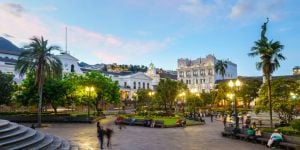
Work in Ecuador
Ecuador is famous as a retirement haven. But you might not want to wait until retirement age to move there and ...

Healthcare in Ecuador
Ecuador, as a fast-developing nation, has laws that are constantly evolving, but one thing is certain: the ongoing ...
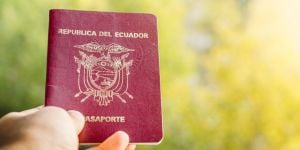
Permanent Residency in Ecuador
Ecuador is calling and you are ready to go and experience all that this gorgeous country has to offer. However, ...

Leisure activities in Ecuador
You have made it to Ecuador, now what is there to do in your free time? A lifetime in Ecuador isn't enough time to ...
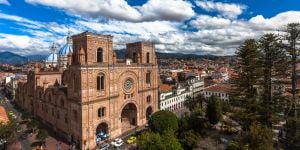
Accommodation in Cuenca
The rose-colored lenses through which potential expats have been made to view Cuenca often blur how the real ...
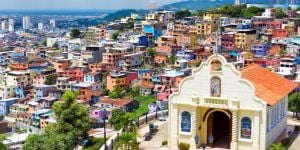
Accommodation in Guayaquil
It's safe to say Guayaquil is not about to threaten Cuenca's title as the sweetest spot to retire to – ...

Phones and Internet in Ecuador
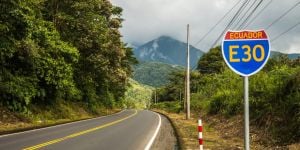
Driving in Ecuador
While public transport is prevalent country-wide and has a great reputation in Ecuador, you may choose to drive ...
Forum topics on shopping in Ecuador
Essential services for your expat journey



